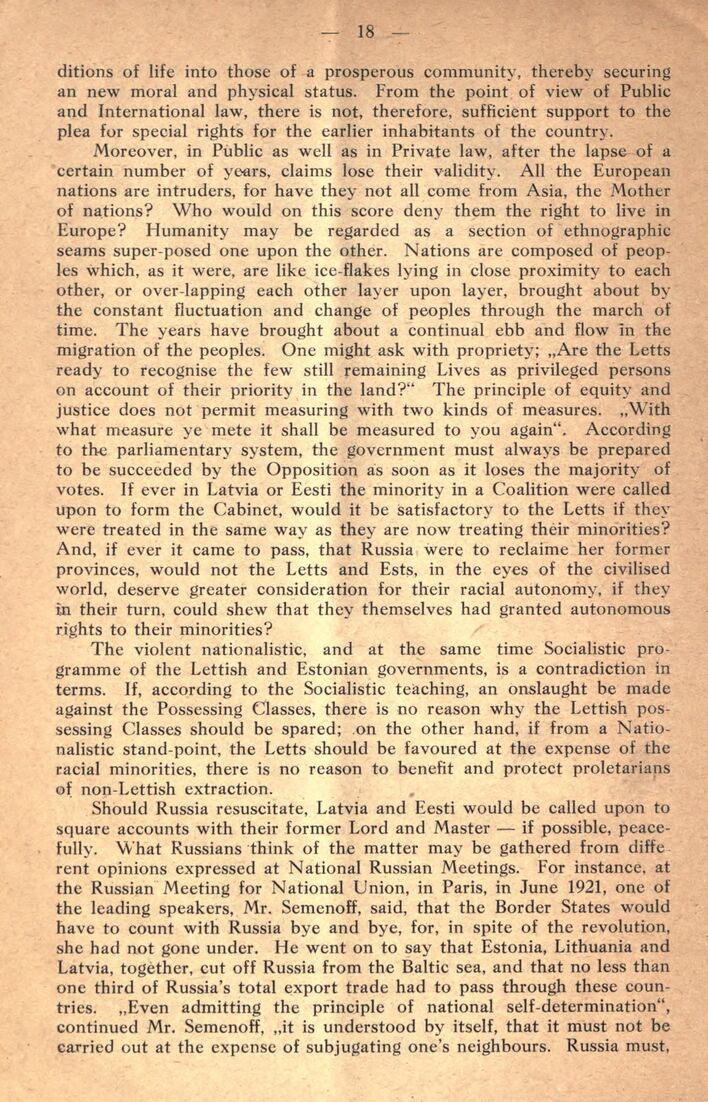
Full resolution (JPEG) - On this page / på denna sida - Chapter II. The Baltic Minorities' Rights. Their relation to Municipal and International Law. Lecture delivered at the Grotius Society in London, November 1921

<< prev. page << föreg. sida << >> nästa sida >> next page >>
Below is the raw OCR text
from the above scanned image.
Do you see an error? Proofread the page now!
Här nedan syns maskintolkade texten från faksimilbilden ovan.
Ser du något fel? Korrekturläs sidan nu!
This page has been proofread at least once.
(diff)
(history)
Denna sida har korrekturlästs minst en gång.
(skillnad)
(historik)
conditions of life into those of a prosperous community, thereby securing
a new moral and physical status. From the point of view of Public
and International law, there is not, therefore, sufficient support to the
plea for special rights for the earlier inhabitants of the country.
Moreover, in Public as well as in Private law, after the lapse of a
certain number of years, claims lose their validity. All the European
nations are intruders, for have they not all come from Asia, the Mother
of nations? Who would on this score deny them the right to live in
Europe? Humanity may be regarded as a section of ethnographic
seams super-imposed one upon the other. Nations are composed of
peoples which, as it were, are like ice-flakes lying in close proximity to each
other, or over-lapping each other layer upon layer, brought about by
the constant fluctuation and change of peoples through the march of
time. The years have brought about a continual ebb and flow in the
migration of the peoples. One might ask with propriety; „Are the Letts
ready to recognise the few still remaining Lives as privileged persons
on account of their priority in the land?“ The principle of equity and
justice does not permit measuring with two kinds of measures. „With
what measure ye mete it shall be measured to you again“. According
to the parliamentary system, the government must always be prepared
to be succeeded by the Opposition as soon as it loses the majority of
votes. If ever in Latvia or Eesti the minority in a Coalition were called
upon to form the Cabinet, would it be satisfactory to the Letts if they
were treated in the same way as they are now treating their minorities?
And, if ever it came to pass, that Russia were to reclaime her former
provinces, would not the Letts and Ests, in the eyes of the civilised
world, deserve greater consideration for their racial autonomy, if they
in their turn, could shew that they themselves had granted autonomous
rights to their minorities?
The violent nationalistic, and at the same time Socialistic
programme of the Lettish and Estonian governments, is a contradiction in
terms. If, according to the Socialistic teaching, an onslaught be made
against the Possessing Classes, there is no reason why the Lettish
possessing Classes should be spared; on the other hand, if from a
Nationalistic stand-point, the Letts should be favoured at the expense of the
racial minorities, there is no reason to benefit and protect proletarians
of non-Lettish extraction.
Should Russia resuscitate, Latvia and Eesti would be called upon to
square accounts with their former Lord and Master — if possible,
peacefully. What Russians think of the matter may be gathered from different
opinions expressed at National Russian Meetings. For instance, at
the Russian Meeting for National Union, in Paris, in June 1921, one of
the leading speakers, Mr. Semenoff, said, that the Border States wrould
have to count with Russia bye and bye, for, in spite of the revolution,
she had not gone under. He went on to say that Estonia, Lithuania and
Latvia, together, cut off Russia from the Baltic sea, and that no less than
one third of Russia’s total export trade had to pass through these
countries. „Even admitting the principle of national self-determination“,
continued Mr. Semenoff, „it is understood by itself, that it must not be
carried out at the expense of subjugating one’s neighbours. Russia must,
<< prev. page << föreg. sida << >> nästa sida >> next page >>